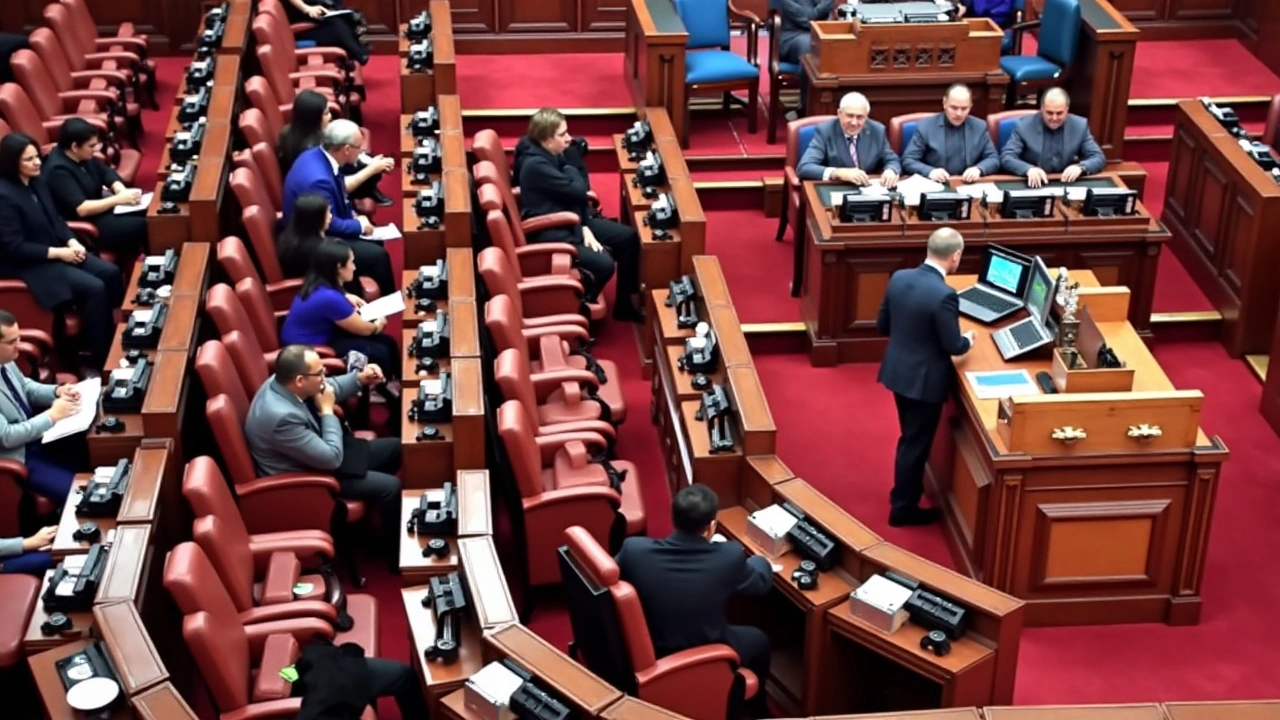Introduction: The Senate Schedules Special Session
The Senate has arranged a special sitting for Wednesday, August 14, to address the pressing matter of the impeachment of Meru Governor Kawira Mwangaza. This session marks the third attempt to unseat the embattled governor, who has faced relentless challenges throughout her term. Political analysts expect a heated debate, especially with discussions about potentially dissolving the entire county government. Such a move could necessitate fresh elections, putting Meru residents back at the polls.

Context of Previous Impeachment Attempts
Governor Mwangaza’s political journey has been fraught with numerous threats of impeachment. Remarkably, she has managed to retain her position despite two prior impeachment motions. However, this time, the stakes seem significantly higher. The county assembly's persistent efforts to remove her have intensified, culminating in a recent vote where 49 Members of the County Assembly (MCAs) supported her impeachment. They accused her of gross constitutional violations, misconduct, and abuse of office—charges she vehemently denies.
Details of the Impeachment Motion
Deputy Majority Leader Zipporah Kinya introduced the impeachment motion, listing three primary allegations against Mwangaza. Even as Mwangaza continues to deny these charges, the support for her impeachment within the county assembly seems substantial. Of 69 MCAs, 49 voted for her removal, while 17 opposed the motion, and three abstained. This division within the county’s political arena underscores the contentious nature of Mwangaza’s tenure.
Underlying Motives
The recurring impeachment attempts against Mwangaza raise questions about the underlying motivations. Some observers argue that these moves are driven more by political maneuvering than genuine legal concerns. The county assembly's relentless pursuit of her ouster suggests that political dynamics, rather than solid legal grounds, are at play. This notion gains traction considering that this is the fifth attempt to remove her from office since she assumed the role.
The Senate's Role: Legal and Political Responsibilities
The Senate’s responsibility in this scenario is pivotal. According to Article 181 of the Constitution and Section 33 of the County Governments Act, it falls upon the Senate to investigate the allegations against the governor. A special committee of eleven senators may be established to handle this investigation, following which the Senate will cast a vote to determine if the charges are substantiated.
If a majority of senators support the impeachment, Governor Mwangaza will be immediately removed from office. Conversely, if the Senate dismisses the charges, the Meru County Assembly will be informed, and Mwangaza will continue her tenure—until faced with the next challenge.
Looking Back: Previous Senate Decisions
Governor Mwangaza’s last impeachment attempt saw the Senate overwhelmingly dismiss the charges against her. During those proceedings, senators across party lines voted in her favor, citing a lack of evidence. Even with serious accusations like misappropriation of county resources, nepotism, and illegal appointments, the Senate found no substantial proof to uphold the charges. The then-Senate Speaker Amason Kingi declared that none of the allegations were substantiated, allowing Mwangaza to remain in office. However, this did little to decrease the political friction in Meru, with MCAs continuing their campaign to remove her.
Current Political Climate
As the Senate prepares for the upcoming session, the political atmosphere remains charged. Narok Senator Ledama Olekina has already voiced concerns over the process. In a recent television appearance, Olekina suggested that the ongoing conflict in Meru might be more about political rivalry than actual legal breaches. He argued that in Kenya, impeachment cases are often politically motivated, raising doubts about the impartiality of the proceedings.
Future Implications: A Turning Point for Governor Mwangaza
The upcoming Senate session could be a significant turning point for Governor Mwangaza. Whether she manages to escape impeachment once again or faces removal depends not only on the evidence but also on the broader political dynamics at play. The outcome of this special session could reshape the political landscape in Meru, possibly even leading to the dissolution of the county government. If that happens, Meru residents will have to prepare for fresh elections, adding another layer to the ongoing political drama in the region.
In conclusion, the Senate’s decision on Wednesday will be closely watched by political observers, residents of Meru, and beyond. This high-stakes political drama continues to unfold, offering a complex mix of legal scrutiny and political maneuvering that encapsulates the challenges of governance in contemporary Kenya.

Cara McKinzie
August 14, 2024 AT 18:26Yo, this whole impeachment saga is like reality TV on steroids. The Senate is about to turn Meru into a circus arena and everyone's got front row tickets. I can already see the drama unfolding – accusations flying, politicians pointing fingers, and the public just scrolling through the mess. It's a classic case of power plays masquerading as justice, and we all know how that ends. Buckle up, folks, because this one's going to be a wild ride.
Joseph Conlon
August 15, 2024 AT 02:00While everyone seems entranced by the melodrama, it's worth noting that the Senate's involvement could set a precedent for future governance disputes. The procedural aspects, like the composition of the eleven‑senator committee and the constitutional references, often get lost in the hype. Moreover, the underlying political calculus shouldn't be dismissed as mere theatrics; parties are leveraging this to cement their influence across county lines. The timing of this session, just weeks before the next electoral cycle, suggests strategic maneuvering that goes beyond the stated legal imperatives. In any case, the Senate must navigate a labyrinth of political bias, media pressure, and the genuine need for accountability, all while maintaining a veneer of impartiality.
Mohit Singh
August 15, 2024 AT 10:20The whole thing feels like a staged showdown, but the real impact is on the people of Meru who get stuck in the crossfire. On one hand, there are genuine concerns about governance; on the other, it's just power playing out in the spotlight. I can see both the aggressive push to remove Mwangaza and the passive resistance from her allies. Either way, the stakes are high and the fallout will likely affect service delivery for ordinary citizens.
Damian Liszkiewicz
August 15, 2024 AT 18:40Hey everyone, let’s try to keep the discussion constructive 😊. Whatever the outcome, it’s a chance for Meru’s institutions to reflect on accountability and transparency. If the Senate conducts a thorough, unbiased investigation, it could strengthen public trust. On the flip side, political gamesmanship could erode confidence. Either way, staying informed and supporting civil society’s role is essential. 🌍💡
Angela Arribas
August 16, 2024 AT 03:00Honestly, this whole narrative is riddled with grammatical errors and moral shortcuts 😒. One must adhere to proper language standards when discussing constitutional matters, otherwise the discourse loses credibility. The accusations lack concrete evidence, making the impeachment motion appear more like a moral crusade than a legal necessity. Please, let’s elevate the conversation and avoid the sensationalist nonsense. 🙅♀️
Sienna Ficken
August 16, 2024 AT 11:20Oh, look at this, another political soap opera where everyone pretends to be a hero while secretly auditioning for the role of villain. The Senate’s “special session” is basically a stage for earnest melodrama, complete with over‑the‑top accusations and a soundtrack of sighs. It’s fascinating how quickly the narrative flips from “gross constitutional violations” to “no evidence, move on.” If only the drama could be as entertaining as it sounds, perhaps we’d get more viewers than voters. 🎭
Zac Death
August 16, 2024 AT 19:40The upcoming Senate deliberation is, without doubt, a critical juncture for both Meru County and the broader Kenyan political framework. First, it underscores the essential function of checks and balances, reminding us that no single office can operate above scrutiny. Second, the procedural safeguards embedded in Article 181 and the County Governments Act are there to ensure due process, yet they are only as effective as the political will behind them. Third, the stark division among the MCAs - 49 for impeachment, 17 against, and three abstentions - highlights deep-rooted fissures that may not be resolved through a single vote.
Moreover, the historical context cannot be ignored: the previous Senate dismissal of charges against Governor Mwangaza set a precedent that could influence current senators' disposition. Some may view that decision as vindication of the governor, while others might see it as a missed opportunity to enforce accountability. Fourth, the looming possibility of dissolving the entire county government introduces a cascade of logistical challenges, from mounting fresh elections to ensuring uninterrupted public services. The administrative burdens alone could tempt legislators to opt for the less disruptive route.
Fifth, the political undercurrents, as highlighted by Senator Olekina’s remarks, suggest that the impeachment motion may be as much about partisan rivalry as it is about actual misconduct. This raises concerns about the impartiality of the Senate’s investigation. Sixth, the role of civil society and media in shaping public opinion cannot be overstated; they can either amplify calls for transparency or fuel partisan narratives. Seventh, irrespective of the outcome, the perception of legitimacy will hinge on the Senate’s thoroughness and fairness.
Eighth, the aftermath-whether the governor remains or is removed-will set the tone for future governance in Meru. If she stays, she may consolidate power and potentially silence dissent. If she leaves, the county will embark on a new electoral cycle, which could reshape political alliances and policy priorities. Ninth, the broader national implications are significant: other counties may watch this case closely, possibly influencing their own internal dynamics.
Finally, this episode serves as a reminder that democratic institutions must continually evolve to balance authority with accountability. The Senate’s decision, therefore, is not merely a procedural outcome but a statement about the health of Kenya’s political system. In sum, the stakes are high, the variables many, and the potential repercussions profound. Let’s hope the Senate rises to the occasion and navigates this complex terrain with wisdom, fairness, and an unwavering commitment to the rule of law.
Lizzie Fournier
August 17, 2024 AT 04:00Wow, that was a marathon of points-really thorough! Whether you’re for or against the impeachment, it’s clear there’s a lot at stake. I hope the Senate can cut through the noise and focus on what truly matters for Meru’s residents.
JAN SAE
August 17, 2024 AT 12:20Alright, let’s break this down: the Senate’s role is constitutionally mandated, the evidence is allegedly thin, and the political motives are thick. First, the Senate must form a committee – that’s a procedural must, not optional. Second, the governor’s denial of the allegations adds a layer of complexity, because without solid proof, impeachment is just a political weapon. Third, the timing aligns suspiciously with upcoming elections, suggesting strategic positioning. Fourth, history shows the Senate previously dismissed charges, which could influence current sentiment. Fifth, the potential dissolution of the county government would trigger fresh elections – a massive logistical undertaking. Sixth, stakeholders ranging from citizens to NGOs are watching closely, ready to either support or criticize the outcome. Seventh, the outcome will set a precedent for future county‑level conflicts. Eighth, all parties should aim for transparency, for the sake of democratic integrity. Ninth, let’s hope reason prevails over partisanship.
Steve Dunkerley
August 17, 2024 AT 20:40The procedural rigor highlighted earlier is essential; adherence to constitutional provisions ensures legitimacy. Moreover, employing governance terminology-such as “institutional integrity” and “accountability frameworks”-reinforces the analytical depth needed for a robust deliberation.
Jasmine Hinds
August 18, 2024 AT 05:00Can't wait for that fresh election glow 😎
Madison Neal
August 18, 2024 AT 13:20Fresh elections could indeed energize civic participation, offering a chance to reset governance priorities and engage community stakeholders in the democratic process.
John Crulz
August 18, 2024 AT 21:40The Senate will decide.